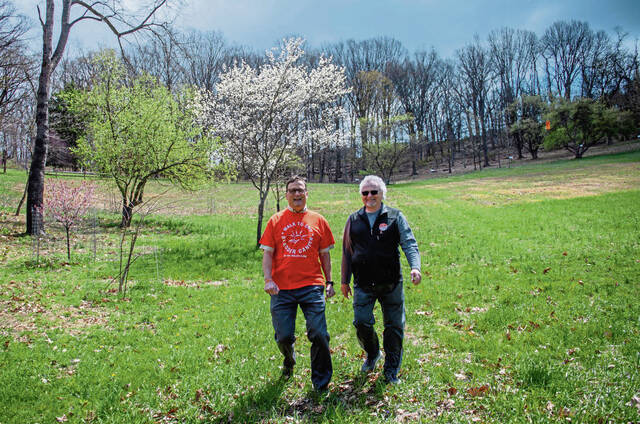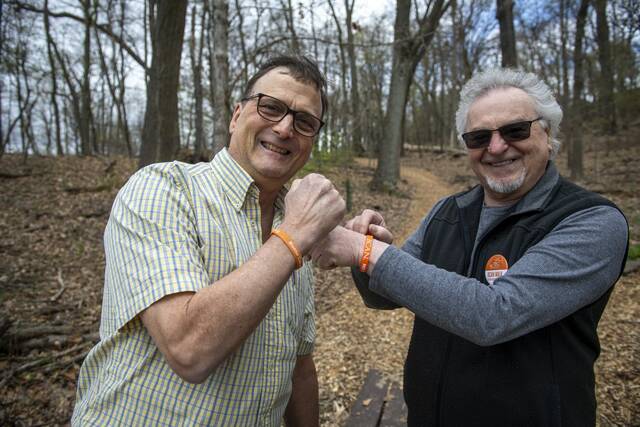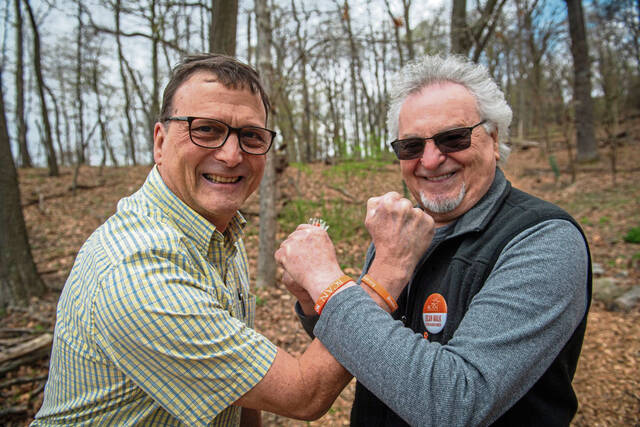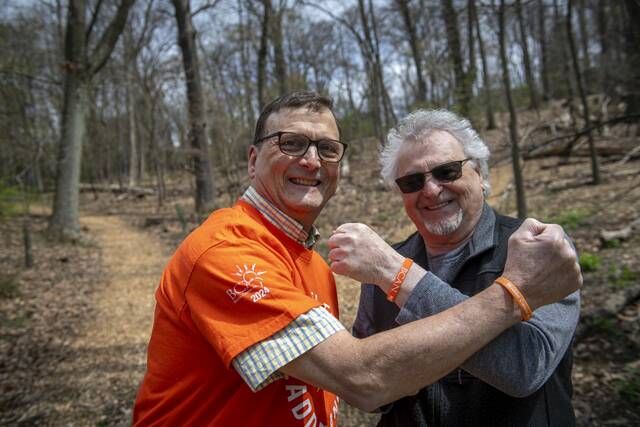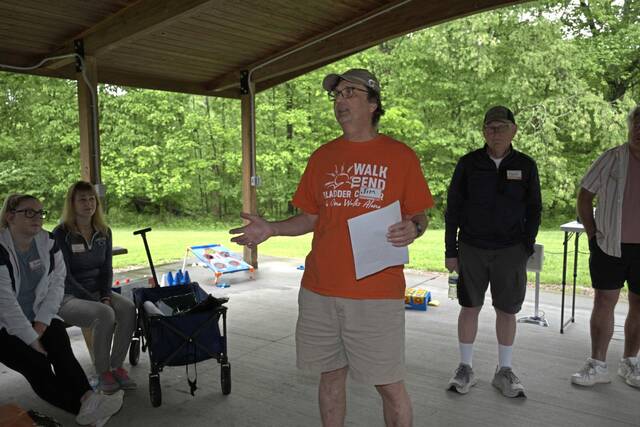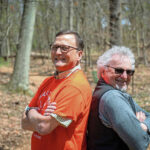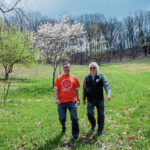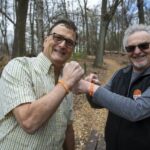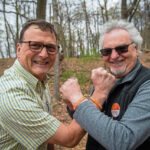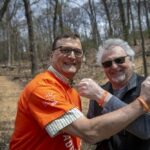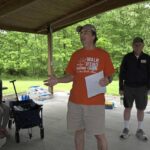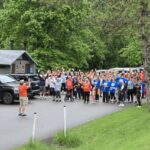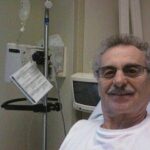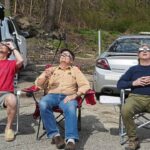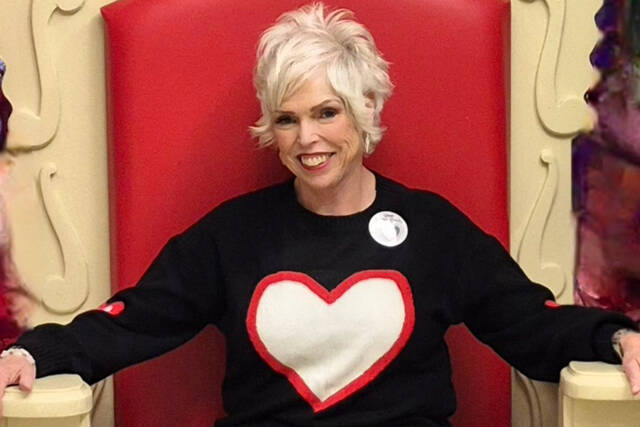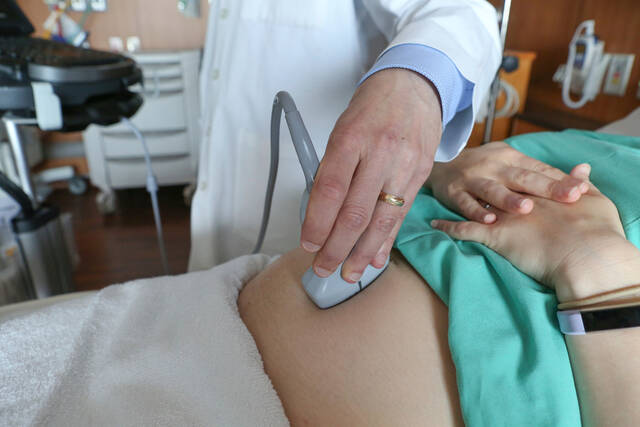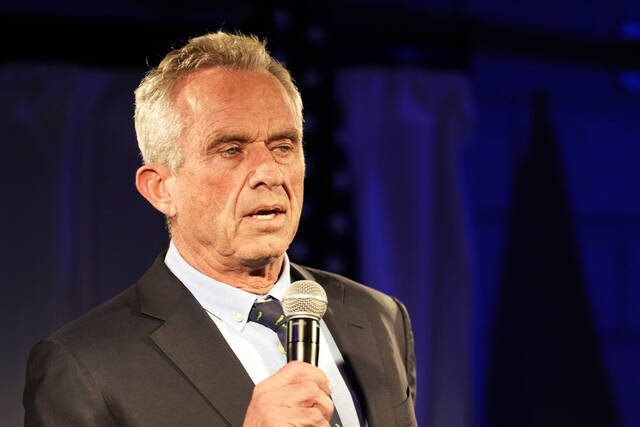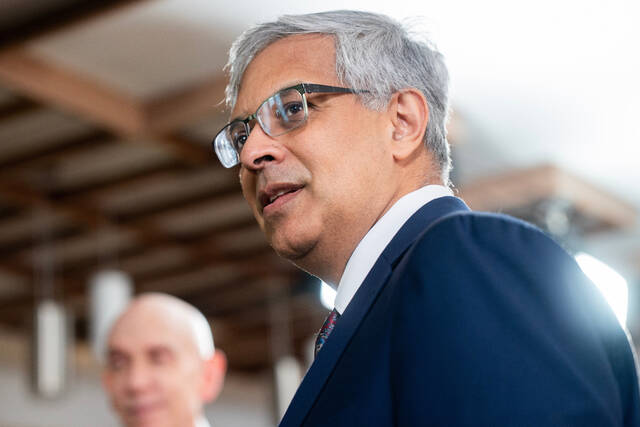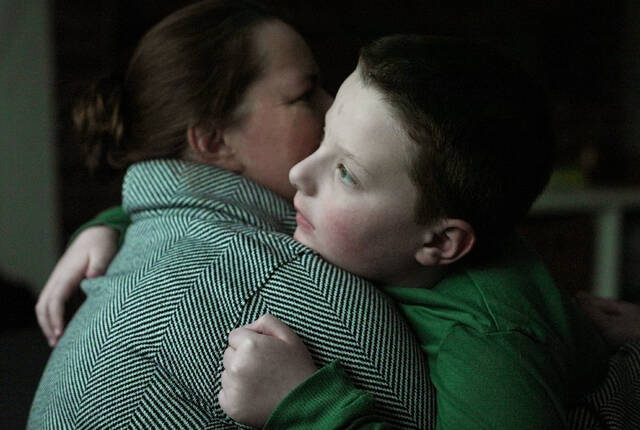Bill Russell and Jim Rieker are survivors.
Both diagnosed with bladder cancer, the men have made it their mission to help others with the disease through the Bladder Cancer Advocacy Network, the largest bladder cancer advocacy group in the nation.
“When I was diagnosed, I didn’t know about the group,” said Russell, 80, of Donora, Washington County. “I was on my own. Once I found the group, I decided to help other newly diagnosed people have someone to talk to. I know through advocacy we can make a difference.”
Part of their involvement is with the local Bladder Cancer Advocacy Network’s Walk to End Bladder Cancer on May 31 in North Park. Russell has been the walk organizer for several years; Rieker is this year’s walk organizer.
The two met through the network’s Survivor 2 Survivor program. It connects newly diagnosed bladder cancer patients and caregivers with survivors and co-survivors — family members, spouses or partners, friends, health care providers or colleagues — who have gone through similar experiences.
“It feels good to help others,” said Rieker, 68, of Upper St. Clair, who was diagnosed when he was 65. “Through phone calls and video-conferencing, I give support to cancer patients that are beginning their journey and face obstacles and tough choices affecting not only themselves, but their friends and family.”
More common in men
Bladder cancer usually begins in the cells that line the bladder, the organ that stores urine. Cancer occurs when cells in the bladder start to grow out of control. Most tumors develop on the inner layer of the bladder, but some can grow into deeper bladder layers. According to the Bladder Cancer Advocacy Network, as cancer grows through these layers into the muscle wall, it becomes harder to treat.
According to the American Cancer Society, bladder cancer is more common in men than women. The American Cancer Society’s estimates for bladder cancer in the United States for 2025 are about 84,870 new cases of bladder cancer (about 65,080 in men and 19,790 in women) and about 17,420 deaths from bladder cancer (about 12,640 in men and 4,780 in women).
Smoking is the highest risk factor for bladder cancer. Other risk factors include exposure to chemicals in certain occupations such as painters, metal workers, leather workers, miners, manufacturers of plastics, and firefighters.
More awareness is needed, Russell and Rieker said.
That begins with noticing something isn’t right with your body. For both men, the initial symptom was the same — blood in their urine.
Russell was in the middle of tax season — February of 2010 — working for H&R Block when he thought something was wrong.
“I kept that to myself until I got all of the taxes done for clients,” said Russell. “I remember putting that last tax form in the mail and then calling my doctor.”
Know your body
The doctor recommended Russell come to the office right away. He was diagnosed in April 2010 at the age of 65. He had surgery that June.
“This disease can be really devastating and it can be really aggressive,” said Russell, a retired traveling auditor for railroad labor unions.
When Rieker spotted blood, he immediately called his doctor.
“I knew I had to act quickly and decisively,” Rieker said.
He was diagnosed in May 2022.
Both men underwent a radical cystectomy surgery, with an ileal conduit diversion, referred to as an RC/IC.
This type of diversion involves removing the diseased urinary bladder and then diverting urine out of the body via a newly constructed conduit made from the ileal part of their colon, Russell said. The point at which the conduit exits the body is called a stoma, and that stoma is what facilitates urine to be stored in an external appliance or bag on the outside of their bodies, hidden by clothing. They also underwent many infusions of chemotherapy as part of their treatment protocol, said Russell.
With some types of diversions, internal bladders are created using the same ileal part of the colon. In those cases, the urine is contained within the body and ultimately diverted out of the body via various methods, which sometimes include a self-catheterization process. There are advantages and disadvantages to each type of diversion, so people generally have a chance to choose which type of diversion they will have if bladder removal is part of their proposed treatment plan, Russell said.
”Everyone’s bladder, whether they have bladder cancer or not, is simply a holding tank, which at some point will need to be emptied,” Russell said.
A new normal
For Russell and Rieker, the bag on the outside of their body can leak if it’s full. If it does leak, it can compromise the glue that holds the bag onto their stomach, Russell said.
“You learn a new normal and to live with it,” said Russell. “You will get through it.”
The early days are the most challenging because of so many unknowns, they both said.
Helping patients navigate those unknowns are Dr. Kathryn Marchetti, a urologic oncology fellow in the Department of Urology at the University of Pittsburgh and UPMC, and a team of urologists and researchers at Pitt and UPMC who are currently investigating a remote monitoring system for bladder cancer survivors to identify physical and emotional needs in real time. This clinical trial provides patients who have recently undergone bladder removal surgery with wearable fitness trackers, such as a Fitbit, which monitors heart rate and body temperatures and alerts the urologist to check in with the patient. The remote monitoring program has identified early signs of complications among the patients participating in the trial.
Since September 2024, the device has been alerting doctors to vital sign abnormalities such as an extremely high heart rate or elevated temperature that can sometimes lead to something such as a urinary tract infection, which when caught early, is always better, said Marchetti, who is not the treating physician for Russell or Rieker.
Sometimes, notifications have prompted physicians to send patients to the emergency room, while other issues can be addressed with a phone call to the patient.
“The information lets us know who is having problems,” Marchetti said. “For me, as a surgeon, the first 30 days after people leave the hospital, unless they call us, we really don’t know how they’re doing. This program is trying to give us an eye into that period. It seems that patients really appreciate having this and knowing a doctor is watching them while they’re home during this kind of vulnerable time. It’s exciting to see that this technology seems to be working and patients really appreciate that level of support after surgery.”
The technology for remote monitoring of patients has been used in other medical situations, such as for postpartum women, but had not been used to monitor patients after cystectomies until recently.
“The program is a good thing because patients going home are adjusting to a lot,” Marchetti said. “Their family has a lot going on as they figure out how to navigate their new normal. Connecting them to providers throughout this time is invaluable. I always say, if you notice something’s not right, do something about it. I’m a big fan of ‘listen to your body.’”
Living full lives
Russell and Rieker are both living full lives, doing the things they love.
Russell goes to the gym and works out on a regular basis. He also does consulting work for a few major pharmaceutical companies, bladder cancer research consulting for the Department of Defense and owns and operates a self-storage rental business. He was a drummer in the U.S. Navy band and plays drums a couple of times a week in a music ministry at The Bible Chapel - Rostraver Campus.
Rieker walks three miles every morning. He also fishes, camps and hikes. He and his brothers travel to the Allegheny National Forest and even though he is semi-retired, he has a small video production business that covers out-of-town events.
Rieker said the TSA staff at airports are well acquainted with ostomies.
“It may take a little planning, and an extra look at your travel checklist, but traveling is not a big deal,” said Rieker. “A positive attitude makes a huge difference. It is an inconvenience but it is a lot better than other medical conditions. I can’t emphasize enough how clueless you are when this happens to you. Some patients are overwhelmed by the thought of the bag. My surgeon put it aptly — your enemy is not the bag, it’s the cancer. I thanked him for giving that essential perspective. Bill became my “Ostomy buddy” who pulled me through. Hearing the stories of others who walk your path is so inspiring.”
Russell recalled his first contact with Rieker on Sept. 24, 2022.
“Jim and I hit it off right from the beginning, as our very first conversation lasted over two hours,” said Russell.
Russell said hopefully, walks such as the one coming up at North Park will help to financially support the Bladder Cancer Advocacy Network in order to eliminate bladder cancer entirely, or at least find better treatment options.
They said they both dream of a day when patients will not have to have their bladders removed.
“When you see blood, you don’t know what to do,” Rieker said. “And then when you hear the word cancer, you will need people around you to support you and we are here to do that,” said Rieker. “I remember I am one of the lucky ones because I am cancer-free. If you see something or feel something, do something.”
Russell, who has been a peer counselor for 14 years for the network and who attends conferences across the U.S., said he and Rieker will be there as long as they are needed.
“We are trying to get the word out, “ Rieker said. “As soon as I was diagnosed, I quickly realized that the love and support of those around me were essential to beating cancer. It is rewarding for Bill and I to be helping others. Our message is one of hope. We are all survivors.”



